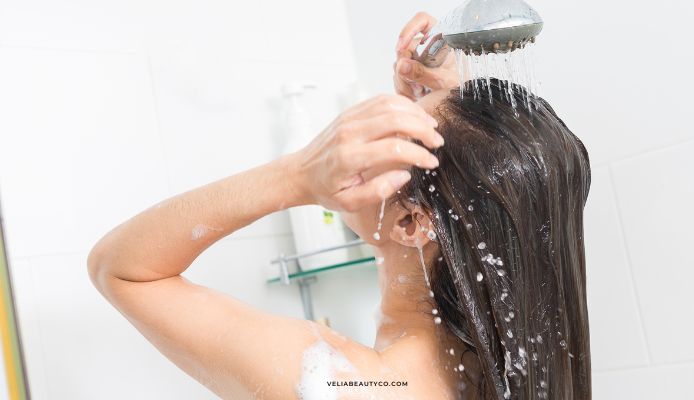
Sulfates, Shampoos, and Hair Care Myths: What You Need to Know
Share
Welcome to The Beauty Lab Blog, where we break down the science of beauty, health, and wellness so you can make informed decisions about your routine. In this post, we’re diving into one of the most talked-about topics in hair care—sulfates—and their role in shampoos. This conversation is inspired by a recent episode of our podcast, where Monina interviewed co-host Velia, a hair care expert with her own product line.
What Are Sulfates?
Sulfates are anionic surfactants, which means they’re powerful cleansing agents that help remove dirt, oil, and product buildup from your hair and scalp. They’re also responsible for creating that luxurious lather we all associate with clean hair. However, they aren’t the only type of anionic surfactants out there.
Types of Surfactants in Shampoo:
-
Anionic Surfactants: Excellent for deep cleansing (e.g., sulfates or sulfonates).
-
Cationic Surfactants: Provide conditioning benefits but aren’t effective cleansers.
-
Amphoteric Surfactants: Offer mild cleansing and conditioning, often used to balance formulas.
While sulfates like sodium lauryl sulfate (SLS) and sodium laureth sulfate (SLES) are common, they’re not the only option. Sulfonates, for instance, are gentler alternatives that can still cleanse effectively without being as harsh.
WANT GREAT HAIR?
Hey Girl! You must be here because you're sick of your hair being greasy and your scalp itchy and flakey. You came to the right place! I put together a free guide that will solve your scalp problems for good and allow you to finally wear black again! No more uncomfortable itchy scalp or flat greasy hair. Just shiny, healthy, soft, CLEAN hair that YOU have control of (not the other way around.) I'm here to help you make every day a great hair day! xoxo- Velia
<< CLICK HERE >>
Are Sulfates Really That Bad?
Sulfates have been demonized in the healthy hair movement, but they’re not inherently “bad.” According to Velia, sulfates are just “overachievers” that can sometimes clean too effectively, stripping away natural oils and even hair color.
When to Avoid Sulfates:
- If you color your hair, as sulfates can strip the pigment.
- If you have chemically treated hair, like a Brazilian blowout.
- If you wash your hair frequently, as sulfates can dry out your scalp.
- Who Can Use Sulfates?
- People with oily hair or scalps (e.g., teenage athletes).
- Those who don’t color or chemically treat their hair.
What About Sulfate-Free Shampoos?
Sulfate-free shampoos are formulated with gentler anionic surfactants like sulfonates, which are effective cleansers but less harsh. These shampoos are ideal for maintaining hair health, especially for those with color-treated or chemically treated hair.
Pro Tip: Look for the word “sulfonate” on the ingredient list to ensure your shampoo has an anionic surfactant for proper cleansing.
Clarifying Shampoos: Use Sparingly
Clarifying shampoos are designed for deep cleaning, often used to remove mineral deposits from hard water or product buildup. However, these shampoos are highly stripping and should only be used once a month at most. Avoid them entirely if you have color-treated hair.
Signs You Might Need a Clarifying Shampoo:
- Hair feels weighed down or greasy despite washing.
- You live in an area with hard water.
Tip: If your clarifying shampoo is clear, it’s likely more cleansing-focused. Creamier shampoos typically offer more conditioning.
Should You Wet Your Hair on Non-Wash Days?
Velia advises against wetting your hair if you’re not planning to wash it. Water has a pH of 7, which raises the cuticle on your hair shaft (ideal pH is 4.5-5.5), leading to dryness and potential color loss. Instead, stick to dry shampoo or minimal styling for non-wash days.
Why Conditioner Matters
Conditioners have a pH of 3.5-5.5, which helps seal the cuticle after washing. This locks in moisture, protects hair from damage, and keeps it looking smooth and shiny. Even if you use a sulfate-free shampoo, always follow up with conditioner to restore balance.
Scalp Scrubbers: Helpful or Harmful?
Silicone scalp scrubbers can enhance your shampooing routine if used correctly. Avoid circular motions that can tangle hair and instead use long, gentle strokes to massage your scalp. Fingertips, however, are often the best tool for a thorough yet gentle clean.
Sleeping with a Ponytail: Yes or No?
Tightly pulled ponytails can cause tension damage to hair follicles, leading to hair loss over time. If you must tie your hair up at night, opt for:
- A loose braid or low ponytail.
- A silk bonnet to protect hair and reduce friction.
